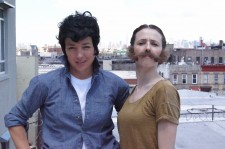 I’ve been lucky enough to spend pretty much the entire month of December with the TEAM. I couldn’t think of a better way to close out 2012. For me, the past few weeks have been a matter of juggling my involvement in two of the TEAM’s long term projects, Primer For a Failed Superpower and RoosevElvis.
I’ve been lucky enough to spend pretty much the entire month of December with the TEAM. I couldn’t think of a better way to close out 2012. For me, the past few weeks have been a matter of juggling my involvement in two of the TEAM’s long term projects, Primer For a Failed Superpower and RoosevElvis.
This weekend, we closed a workshop of the TEAM’s Primer for a Failed Superpower, for which I was the stage manager. This incarnation of the show, however, was performed not by members of the TEAM, but by a group of kick-ass students at NYU’s Playwrights Horizons Theater School. Pieced together by duct tape and hardcore angst, the show ranged from a punk concert to a boxing match. The show sang with youthful abandon and stung with a sharp edge.
The freshness and vitality of this show was undeniable. Written by the group of third and fourth year students who were also its performers, the show exemplified a rich and sophisticated reckoning with the ethos of their generation. Quite simply, they effected an explosive performance, which truly serves as evidence of the unflappable hope and resilience of this generation. As an alumnus of PHTS, it was exciting to see this kind of work happening in my alma mater.
Very recently I went back into rehearsals for RoosevElvis, rehearsing at the TEAM’s space at ART NY. This show, for which I am the assistant director, centers on two of our country’s most worshipped paragons: Theodore Roosevelt and Elvis Presley. Among other things, it focuses on their iconic masculinity, on gendered and sexualized power dynamics, on greatness, and on the formation of a national hero.
With rehearsal topics ranging from tabloid accounts of Elvis’s sex life to Queer theory and discourse, from swinging pelvises to body suits with bound breasts, this week is already proving to be productive, surprising, and as momentous as these two male icons themselves. Kristen and Libby have continued to hit it out of the park, writing on their feet (or at the table) to compose material that plumbs the complexities of these two men and which complicates biographies often presented as singular narratives.
In this week of rehearsal, we’ve met a whole slew of new characters. Kristen, who plays Roosevelt, recently introduced us to John Muir, a renowned American naturalist who was one of Teddy’s closest and most influential friends. Kristen also at times plays Alice, Teddy’s first wife, who appears in chilling, dream-like capitulations of Teddy’s own desire and vulnerability. Libby, playing Elvis, has channeled new characters such as Priscilla Presley – Elvis’s first wife, and several fourteen year-old female characters – who occupied Elvis’s perverse sexual fascination. Additionally, Libby has continued to helm the character of Ann, a genderqueer slaughterhouse worker who invokes Elvis in the privacy of her own home.
And as I watch Kristin and Libby work with Rachel, Jake, and the rest of the team to carve out these narratives, it is apparent that the more light we are able to shed on these characters, the more any sense of definite border, clarity, or boundary seems to blur. That the once monolithic, fixed, masculine identities of both of these characters begin to melt, reducing a polarized view of power and gender to a utopian soup of fluidity and freedom. Teddy is both the body he built and the men who built him. Elvis is not simply man, but he is the multitudes of women he desired, the mother who loved him, and the woman, Libby King, who is embodying him for this performance. These monolithic men subsume contradiction, and become more than they are.
Truly, these guys are bigger than we ever could’ve guessed.